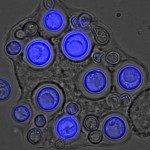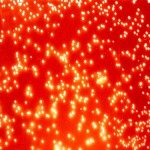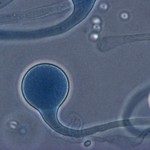Lien vers Pubmed [PMID] – 29691339
Lien DOI – e00573-1810.1128/mBio.00573-18
mBio 2018 04; 9(2):
Mucorales are ubiquitous environmental molds responsible for mucormycosis in diabetic, immunocompromised, and severely burned patients. Small outbreaks of invasive wound mucormycosis (IWM) have already been reported in burn units without extensive microbiological investigations. We faced an outbreak of IWM in our center and investigated the clinical isolates with whole-genome sequencing (WGS) analysis. We analyzed M. circinelloides isolates from patients in our burn unit (BU1, Hôpital Saint-Louis, Paris, France) together with nonoutbreak isolates from Burn Unit 2 (BU2, Paris area) and from France over a 2-year period (2013 to 2015). A total of 21 isolates, including 14 isolates from six BU1 patients, were analyzed by whole-genome sequencing (WGS). Phylogenetic classification based on de novo assembly and assembly free approaches showed that the clinical isolates clustered in four highly divergent clades. Clade 1 contained at least one of the strains from the six epidemiologically linked BU1 patients. The clinical isolates were specific to each patient. Two patients were infected with more than two strains from different clades, suggesting that an environmental reservoir of clonally unrelated isolates was the source of contamination. Only two patients from BU1 shared one strain, which could correspond to direct transmission or contamination with the same environmental source. In conclusion, WGS of several isolates per patients coupled with precise epidemiological data revealed a complex situation combining potential cross-transmission between patients and multiple contaminations with a heterogeneous pool of strains from a cryptic environmental reservoir.IMPORTANCE Invasive wound mucormycosis (IWM) is a severe infection due to environmental molds belonging to the order Mucorales. Severely burned patients are particularly at risk for IWM. Here, we used whole-genome sequencing (WGS) analysis to resolve an outbreak of IWM due to Mucor circinelloides that occurred in our hospital (BU1). We sequenced 21 clinical isolates, including 14 from BU1 and 7 unrelated isolates, and compared them to the reference genome (1006PhL). This analysis revealed that the outbreak was mainly due to multiple strains that seemed patient specific, suggesting that the patients were more likely infected from a pool of diverse strains from the environment rather than from direct transmission among them. This study revealed the complexity of a Mucorales outbreak in the settings of IWM in burn patients, which has been highlighted based on WGS combined with careful sampling.










